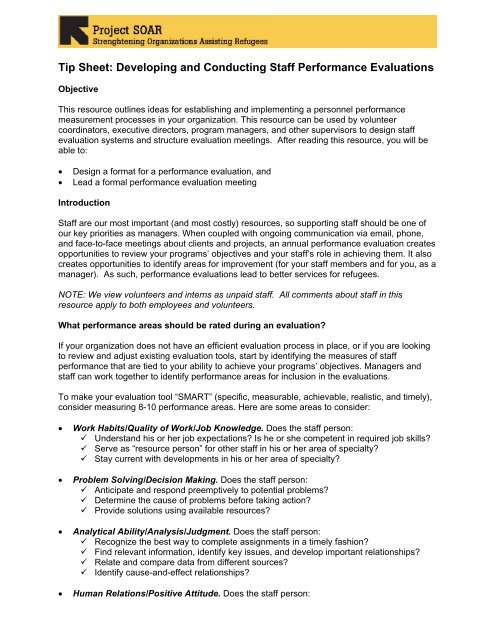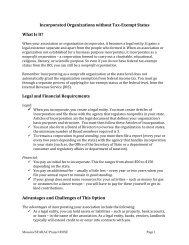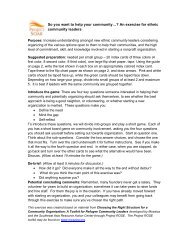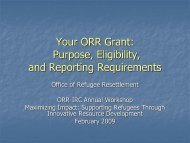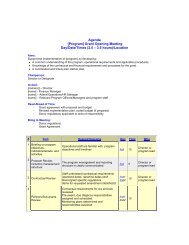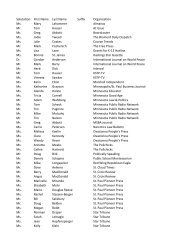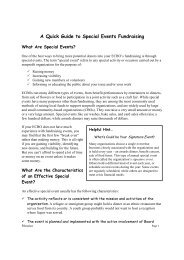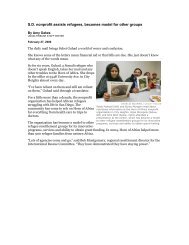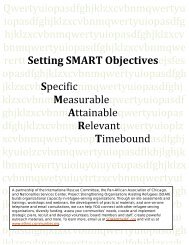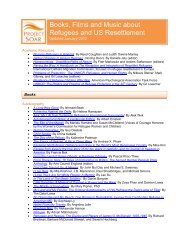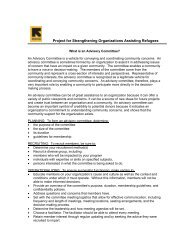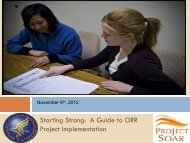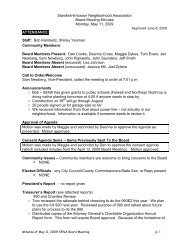Tip Sheet: Developing and Conducting Staff Performance Evaluations
Tip Sheet: Developing and Conducting Staff Performance Evaluations
Tip Sheet: Developing and Conducting Staff Performance Evaluations
You also want an ePaper? Increase the reach of your titles
YUMPU automatically turns print PDFs into web optimized ePapers that Google loves.
<strong>Tip</strong> <strong>Sheet</strong>: <strong>Developing</strong> <strong>and</strong> <strong>Conducting</strong> <strong>Staff</strong> <strong>Performance</strong> <strong>Evaluations</strong><br />
Objective<br />
This resource outlines ideas for establishing <strong>and</strong> implementing a personnel performance<br />
measurement processes in your organization. This resource can be used by volunteer<br />
coordinators, executive directors, program managers, <strong>and</strong> other supervisors to design staff<br />
evaluation systems <strong>and</strong> structure evaluation meetings. After reading this resource, you will be<br />
able to:<br />
• Design a format for a performance evaluation, <strong>and</strong><br />
• Lead a formal performance evaluation meeting<br />
Introduction<br />
<strong>Staff</strong> are our most important (<strong>and</strong> most costly) resources, so supporting staff should be one of<br />
our key priorities as managers. When coupled with ongoing communication via email, phone,<br />
<strong>and</strong> face-to-face meetings about clients <strong>and</strong> projects, an annual performance evaluation creates<br />
opportunities to review your programs’ objectives <strong>and</strong> your staff’s role in achieving them. It also<br />
creates opportunities to identify areas for improvement (for your staff members <strong>and</strong> for you, as a<br />
manager). As such, performance evaluations lead to better services for refugees.<br />
NOTE: We view volunteers <strong>and</strong> interns as unpaid staff. All comments about staff in this<br />
resource apply to both employees <strong>and</strong> volunteers.<br />
What performance areas should be rated during an evaluation?<br />
If your organization does not have an efficient evaluation process in place, or if you are looking<br />
to review <strong>and</strong> adjust existing evaluation tools, start by identifying the measures of staff<br />
performance that are tied to your ability to achieve your programs’ objectives. Managers <strong>and</strong><br />
staff can work together to identify performance areas for inclusion in the evaluations.<br />
To make your evaluation tool “SMART” (specific, measurable, achievable, realistic, <strong>and</strong> timely),<br />
consider measuring 8-10 performance areas. Here are some areas to consider:<br />
• Work Habits/Quality of Work/Job Knowledge. Does the staff person:<br />
Underst<strong>and</strong> his or her job expectations? Is he or she competent in required job skills?<br />
Serve as “resource person” for other staff in his or her area of specialty?<br />
Stay current with developments in his or her area of specialty?<br />
• Problem Solving/Decision Making. Does the staff person:<br />
Anticipate <strong>and</strong> respond preemptively to potential problems?<br />
Determine the cause of problems before taking action?<br />
Provide solutions using available resources?<br />
• Analytical Ability/Analysis/Judgment. Does the staff person:<br />
Recognize the best way to complete assignments in a timely fashion?<br />
Find relevant information, identify key issues, <strong>and</strong> develop important relationships?<br />
Relate <strong>and</strong> compare data from different sources?<br />
Identify cause-<strong>and</strong>-effect relationships?<br />
• Human Relations/Positive Attitude. Does the staff person:
Display commitment to your organization <strong>and</strong> refugee clients?<br />
Support your organization’s goals by demonstrating loyalty <strong>and</strong> dedication?<br />
Display poise <strong>and</strong> courtesy, even in challenging situations?<br />
• Empathy with Clients. Does the staff person:<br />
Actively respond to clients’ needs?<br />
Build trust with clients through attention to detail, listening, <strong>and</strong> communication?<br />
Go the “extra mile” to provide high quality services to clients?<br />
• Ability to Work Independently. Does the staff person require minimal supervision to<br />
perform majority of his of her duties?<br />
• Familiarity with Work. Does the staff person:<br />
Follow established company policies <strong>and</strong> procedures when appropriate?<br />
Make accurate <strong>and</strong> timely decisions?<br />
• Productivity/Management of Resources. Does the staff person:<br />
Perform tasks thoroughly?<br />
Meet deadlines <strong>and</strong> prioritize various assignments appropriately?<br />
Produce the required level of documentation?<br />
Maintain an organized work area?<br />
• Attention to Quality. Does the staff person:<br />
Set high st<strong>and</strong>ards for personal performance <strong>and</strong> client relations?<br />
Exert extra effort to ensure quality work is delivered to clients in a timely fashion?<br />
Strive to continuously improve processes <strong>and</strong> learn best practices?<br />
• Adaptability. Does the staff person:<br />
Quickly respond to changing priorities?<br />
Exhibit flexibility, open-mindedness, <strong>and</strong> acceptance of feedback <strong>and</strong> criticism?<br />
Switch between various tasks, depending on work flow <strong>and</strong> daily dem<strong>and</strong>s?<br />
Respond efficiently under stress?<br />
• Goal Orientation. Does the staff person:<br />
Stay focused on program goals?<br />
Follow through on tasks?<br />
Anticipate obstacles <strong>and</strong> think<br />
ahead to next steps?<br />
Assume responsibility beyond the<br />
scope of normal work duties to achieve overall organization <strong>and</strong> program goals?<br />
• Communication. Does the staff person:<br />
Organize <strong>and</strong> present ideas clearly, concisely, <strong>and</strong> logically both orally <strong>and</strong> in writing?<br />
Adjust speaking <strong>and</strong> writing style to meet needs of clients, funders, <strong>and</strong> others?<br />
Actively participate in meetings <strong>and</strong> provide valuable feedback?<br />
• Integrity. Does the staff person:<br />
Display high st<strong>and</strong>ards for honesty?<br />
Demonstrate ethical behavior in the execution of all tasks?<br />
Build trust <strong>and</strong> respect in relationships with peers <strong>and</strong> clients?<br />
TIP: In deciding what criteria to include in your<br />
evaluation tool, consider brainstorming a list<br />
of all of possibilities. Rate each option on a<br />
scale of 1-5 (where 1=not crucial; 2=has some<br />
importance; 3=important 4=essential; <strong>and</strong><br />
5=crucial). Include the most highly rated<br />
criteria on your evaluation.<br />
• Personal Responsibility. Does the staff person:<br />
Accept responsibility for tasks?<br />
Exhibit professionalism in the resolution of work environment issues?
• Forward Thinking/Initiative. Does the staff person:<br />
Generate innovative ideas, approaches, <strong>and</strong> solutions to better serve refugees’ needs<br />
<strong>and</strong> to meet program goals?<br />
Listen to <strong>and</strong> builds on others’ ideas <strong>and</strong> generate suggestions for improving work?<br />
Meet challenges with resourcefulness?<br />
• Commitment to Teamwork. Does the staff person:<br />
Demonstrate diplomacy <strong>and</strong> the ability to work cooperatively with other staff members?<br />
Display willingness to help others when needed?<br />
Keep team members apprised of developments in work done independently?<br />
Encourage open communication <strong>and</strong> avoid destructive interpersonal behavior such as<br />
gossip?<br />
• Dependability. Does the staff person:<br />
Arrive to work on time <strong>and</strong> honor scheduled break times?<br />
Makes advance requests for absences in order to enable appropriate staff coverage?<br />
• Leadership (for staff who supervise other staff or volunteers). Does the staff person:<br />
Apply leadership abilities, motivate others to support programmatic goals, <strong>and</strong><br />
delegate tasks wisely?<br />
Plan, coordinate, <strong>and</strong> follow-up on the work of others, if deemed necessary?<br />
Effectively select <strong>and</strong> develop personnel?<br />
Deal appropriately with clients regarding unsatisfactory work by subordinates?<br />
Once you select the areas for evaluation, decide on a format. The format is up to you, but it<br />
should be written <strong>and</strong> should be consistent for all employees. Some organizations use a simple<br />
memo format, while others use structured forms. Samples are provided in this resource, <strong>and</strong><br />
many others are available on the Internet or from other organizations.<br />
Engaging your staff members in the development (or improvement) of your organization’s<br />
performance evaluation procedures will help foster a trusting <strong>and</strong> productive working<br />
environment.<br />
Now that I have an evaluation format, how should I share the information with my staff?<br />
Set up a block of uninterrupted time to meet with your staff, <strong>and</strong> request a meeting time a week<br />
or more in advance.<br />
When planning for your meeting, consider the following questions. Summarize your reflections<br />
in your conversation with your employee.<br />
• To improve his/her effectiveness in the job, on what should the employee focus? What<br />
should he or she avoid doing in the future?<br />
• Were there notable obstacles to the employee achieving his or her responsibilities during<br />
the performance review period? If so, what were they?<br />
• What events occurred in the employee’s performance over the past evaluation period?<br />
Next, draft a list of questions to ask the employee during the meeting. Here are some examples:<br />
• What skills would you like to develop in the year ahead?<br />
• What special contributions do you feel you have made to our organization during the<br />
performance review period?<br />
• What do you believe were the most important aspects of your job during the performance<br />
review period?<br />
• What can I, as your supervisor, do to better support you in your job?
The following tips will help you conduct a productive meeting – <strong>and</strong> will set the tone for a<br />
productive working relationship in-between reviews.<br />
Prepare<br />
Schedule evaluations of staff members around the same time period (e.g. December).<br />
Some organizations schedule performance evaluation cycles to precede their annual<br />
budgeting processes, so that any merit-based salary increases can be considered in the<br />
budgeting process.<br />
Provide the employee with a recent job description <strong>and</strong> blank evaluation form for selfassessment,<br />
in advance. Ask the employee to return the completed self assessment<br />
form prior to his or her scheduled performance evaluation.<br />
Make sure to set aside at least 30 – 60 quiet minutes to discuss your feedback, the staff<br />
members’ self-assessment, <strong>and</strong> the staff member’s job description.<br />
Bring any pertinent data for the discussion (e.g. self-assessment form, past <strong>and</strong> current<br />
job descriptions, information on any training received or requested, etc.)<br />
Do not schedule the review conversation in between meetings or at the end of a long<br />
workday. Allow plenty of time, <strong>and</strong> do not allow any interruptions. Ensure complete<br />
privacy – schedule a conference room if necessary.<br />
Make your evaluation process available to your volunteers, as well as your paid staff<br />
members. Providing volunteers with feedback on their performance will improve their<br />
ability to support your programs, <strong>and</strong> may encourage them to represent your<br />
organization positively in the community.<br />
Be Positive<br />
Open <strong>and</strong> close the conversation with positive feedback. Use phrases such as “I count<br />
on you because…”<br />
Single out specific accomplishments for special praise.<br />
Look for opportunities to use the staff member’s strengths to the benefit of the<br />
organization. For example, discuss how your staff member can develop strengths<br />
further, whether through training or other means.<br />
Focus on the performance, not the person.<br />
Stick to behaviors <strong>and</strong> performance from the past year.<br />
Avoid extreme expressions such as “you always…” or “you never…”<br />
Never compare one employee with another.<br />
Offer realistic solutions to problems, <strong>and</strong> make sure to follow-up after the meeting.<br />
If the employee has been underperforming in some area, offer examples of the<br />
problematic behaviors <strong>and</strong> preferable behaviors. Agree on a plan of action.<br />
Emphasize improvement for the future, rather than criticism of the past.<br />
Provide Critical Feedback<br />
Listen without interrupting. Give opportunities for your staff member to ask questions.<br />
Ask your own open-ended questions to encourage communication.<br />
Give your staff member a chance to restate your feedback in his or her own words.<br />
When giving feedback, reference specific examples of actions, dates, <strong>and</strong> events, rather<br />
than speaking abstractly.<br />
Give the staff member time to think before responding. Ask whether he or she agrees<br />
with the feedback you provide.<br />
Explore together options for change <strong>and</strong> agree on a course of action.<br />
Follow-up<br />
Update your memo or form to reflect new information from the evaluation.
After the evaluation, meet with each employee briefly to discuss the final evaluation<br />
form, set specific, measurable, attainable goals for the upcoming year, <strong>and</strong> review <strong>and</strong><br />
update the job description as<br />
necessary. Your employee should<br />
agree in advance to the specific<br />
behavioral changes which will<br />
indicate successful improvement.<br />
Both parties should sign any<br />
document that outlines objectives<br />
for the upcoming year. This<br />
document can be referenced in the<br />
next year’s review. Provide the<br />
employee with copies of the<br />
signed documents. Store the completed personnel documents in the staff member’s file.<br />
Store electronic copies of all signed documents in a confidential location. If your<br />
organization has a human resources director, send copies of these forms to him or her.<br />
If desired, schedule a mid-year check-in with your employee. Otherwise, repeat the<br />
review process after one year.<br />
H<strong>and</strong>le Disagreements Professionally<br />
You <strong>and</strong> your staff member should try to underst<strong>and</strong> each others’ perspectives <strong>and</strong><br />
come to an agreement on goals for moving forward.<br />
If there is disagreement on the performance review, instruct your employee to write a<br />
letter outlining his or her specific disagreements. Attach this to the evaluation, <strong>and</strong><br />
include copies in the staff member’s personnel folder.<br />
Conclusion<br />
To keep staff members moving forward <strong>and</strong> ready to take on new challenges, set goals, identify<br />
new areas of responsibility <strong>and</strong> provide opportunities that will exp<strong>and</strong> their professional<br />
development. The staff needs to know what is a good performance benefiting the organization,<br />
how it’s measured, <strong>and</strong> how it is rewarded. Clarifying these concepts should be the goal of your<br />
evaluation system.<br />
For more information<br />
TIP. Copies of evaluations that have been signed<br />
by you <strong>and</strong> the staff person should be placed in<br />
the employee’s confidential personnel file. This is<br />
also where you will keep documentation about<br />
the staff member’s performance during the year<br />
such as letters of commendation from clients, or<br />
notes from conversations about areas for<br />
improvement. This will help you when preparing<br />
future evaluations (<strong>and</strong> when writing<br />
recommendations for former staff).<br />
• Read A Nonprofit Organization Operating Manual, by Arnold <strong>and</strong> Philip Olenick, The<br />
Foundation Center, New York, 1991.<br />
• Visit www.EthnicCommunities.org. The Strengthening Human Resources section of the<br />
Resource Library contains practical guides on Recruiting <strong>and</strong> <strong>Developing</strong> <strong>Staff</strong>, Volunteer<br />
Management, <strong>and</strong> <strong>Conducting</strong> <strong>Performance</strong> Evaluation Meetings.<br />
Acknowledgements: This resource was researched, written, <strong>and</strong> designed by Leyla<br />
Dursunova, Program Coordinator at Nationalities Services Center, drawing upon resources from<br />
Philadelphia Youth Network, the Marshall Brooks Library at Principia College, <strong>and</strong> the Blue<br />
Ridge Foundation. Harriet Kuhr, Project SOAR Field Advisor <strong>and</strong> Manager of Resettlement<br />
Programs at the IRC’s office in Atlanta, also contributed.<br />
This Project SOAR <strong>Tip</strong> <strong>Sheet</strong> is produced under the auspices of the International Rescue Committee pursuant to<br />
grant number 90RB0028 from the U.S. Office of Refugee Resettlement (ORR). The opinions expressed do not<br />
necessarily state or reflect those of ORR.
Attachment 1. Sample Employee Evaluation Form, Version 1<br />
NAME JOB TITLE DATE HIRED<br />
From:<br />
To:<br />
REVIEWING MANAGER REVIEW PERIOD REVIEW DATE<br />
General Questions<br />
Please complete the following form prior to your review discussion with your supervisor. The<br />
purpose of these questions is to stimulate your thinking about past <strong>and</strong> future goals <strong>and</strong><br />
achievements, <strong>and</strong> to provide you with the opportunity to consider your job in the broader<br />
context of our organization’s mission.<br />
1) What do you see as your major accomplishments over the past review period? What contributions<br />
to our organization are you most proud of?<br />
2) What have you learned over the past year at our organization that has contributed to your<br />
professional or personal growth? Are there experiences which st<strong>and</strong> out in particular as “lessons<br />
learned?”<br />
a) Professional:<br />
b) Personal:<br />
3) Are there any areas in which you are not satisfied with your own job performance?<br />
4) What do you like most about your job? What do you like least? Can you suggest any ways to<br />
maximize the positive aspects or improve upon the negative ones?<br />
Goal Setting<br />
During your conversation with your supervisor, you will evaluate the achievement of your past work<br />
goals <strong>and</strong> set targets for the coming year. These can be<br />
• Skill-related – “I want to improve my efficiency as measured by the number of clients I can<br />
respond to each day.”<br />
• Interpersonal – “I want to work on my ability to provide support to others in the office.”<br />
• Developmental – “I would like to master foreign language skills well enough to start using it<br />
consistently in communications with non-English speaking clients.”<br />
Please bear in mind that for a goal to be successful, it should be “SMART”— Specific,<br />
Measurable, Attainable, Relevant, <strong>and</strong> Time-bound.
1) Describe 2–3 major goals <strong>and</strong>/or developmental steps you set out to accomplish this past year.<br />
What were the results? (Please be as specific as possible in describing both your achievements<br />
<strong>and</strong> the ways in which they helped our organization advance its mission.)<br />
2) What did you hope to accomplish this year, but were unable to? Why?<br />
3) Are there any areas in which you would like to develop your job-related knowledge or skills?<br />
Please include any specific trainings or workshops you would like to take.<br />
4) What major goals have you set for yourself for the upcoming year? Are there any new types of<br />
projects you would like to be involved in?<br />
Goal Review <strong>and</strong> Goal Setting - TO BE COMPLETED TOGETHER WITH EMPLOYEE<br />
Please refer to last year’s performance evaluation when completing this section.<br />
REVIEW OF PAST YEAR’S GOALS:<br />
GOAL DESCRIPTION OF RESULTS NEEDS MORE WORK?<br />
1.<br />
2.<br />
3.<br />
SETTING NEXT YEAR’S GOALS:<br />
Note: To be successful, a goal should be “SMART”— Specific, Measurable, Attainable, Relevant,<br />
<strong>and</strong> Time-bound. Goals should include any planned trainings as well as work targets.<br />
GOAL WHAT SUCCESS WILL LOOK LIKE DEADLINE(S)<br />
1.<br />
2.<br />
3.
Suggestions<br />
1) Do you possess any skills which you are not currently using in your job but which could be useful<br />
to our organization?<br />
2) Are there any tasks/duties which you believe should be added to or dropped from your job<br />
description?<br />
3) Please share any concerns you may have about team dynamics at Organization:<br />
4) Do you have any ideas for ways in which the stressful aspects of your job can be minimized or<br />
offset?<br />
Position-specific Responsibilities<br />
Please answer the following questions with reference to the specific behaviors <strong>and</strong><br />
accomplishments detailed in the employee’s job description. (Attach a copy of the job<br />
description to this document.)<br />
1) What do you consider to be this employee’s major achievements over the past review period?<br />
2) Which of the employee’s professional or personal skills have been most effective in helping<br />
her/him to fulfill the responsibilities of her/his job?<br />
3) Which areas of performance might require more attention or improvement?<br />
Suggestions for Training & Further Development<br />
Based on the evaluations above, please use this space to make any recommendations for<br />
specific training opportunities.<br />
My signature below acknowledges that I have read <strong>and</strong> discussed the contents of this<br />
performance review with my supervisor/employee <strong>and</strong> that we have agreed upon the goals<br />
outlined above. (If there is significant disagreement about any area of this review, the employee<br />
should attach a letter explaining her/his specific objections.)<br />
_______________________________________________<br />
Employee<br />
(Date)<br />
_______________________________________________<br />
Supervisor<br />
(Date)
Attachment 2. Sample Employee Evaluation Form, Version 2<br />
Report On:<br />
Period Evaluated:<br />
_____________________________________________________<br />
_____________________________________________________<br />
Nature of Work: _____________________________________________________<br />
Prepared By:<br />
_____________________________________________________<br />
SECTION ONE<br />
Grade the staff member on each listed item by number:<br />
(5) Outst<strong>and</strong>ing (4) Above Average (3) Satisfactory (2) Below Average (1) Unsatisfactory<br />
In the space provided, please give comments (if any) that will assist in appraising <strong>and</strong> counseling the staff<br />
member. It is extremely important that your comments furnish a full explanation <strong>and</strong> justification of<br />
outst<strong>and</strong>ing or unsatisfactory ratings. Specific illustrations are more helpful than general comments. If<br />
space is insufficient, continue on a separate sheet <strong>and</strong> staple to this form.<br />
GENERAL PERFORMANCE FACTORS<br />
• QUALITY OF WORK ( )<br />
• WORK HABITS ( )<br />
• INITIATIVE ( )<br />
• DEPENDABILITY ( )<br />
Unexcused lateness: Weekly ( ) Bi-monthly ( ) Other ( )<br />
Time Deficiency: Vacation ( ) Sick ( ) Personal ( )<br />
• ANALYTICAL ABILITY ( )<br />
• CREATIVITY ( )
• HUMAN RELATIONS ( )<br />
• EMPATHY WITH CLIENTS ( )<br />
• CLIENT EVALUATIONS ( )<br />
Number Considered: ( )<br />
Number Favorable: ( )<br />
Number Unfavorable: ( )<br />
SPECIFIC PERFORMANCE FACTORS<br />
• Ability to prepare <strong>and</strong> draft necessary writing, etc. ( )<br />
• Knowledge of programs <strong>and</strong> goals, organization’s mission <strong>and</strong> vision ( )<br />
• Ability to research for resources <strong>and</strong> network for additional services available ( )<br />
• Representing clients’ interests <strong>and</strong> advocacy, ability to connect to available resources ( )<br />
• Grant Reporting Requirements ( )<br />
Ability to meet level of service for funding sources? Yes ____<br />
No ____<br />
Complies with funding source reporting requirements in a timely fashion?<br />
Yes ______<br />
No ______<br />
• Review of Case Files ( )<br />
Number Open: __________ Number Reviewed: __________
Are files kept in an orderly manner? Yes ______<br />
No ______<br />
Are legible notes in files setting out chronology of event? Yes/No (circle one)<br />
SECTION TWO<br />
OVERALL PERFORMANCE RATING<br />
1. Needs Improvement (Has not met st<strong>and</strong>ards of all noted competencies to perform effectively)<br />
2. Meets Quality St<strong>and</strong>ards (Generally is progressing as expected <strong>and</strong>/or is meeting st<strong>and</strong>ard<br />
performance)<br />
3. Exceptional (<strong>Performance</strong> is well above average, consistently exceeding st<strong>and</strong>ard)<br />
PERFORMANCE COMMENTS<br />
1. To improve his/her effectiveness in the job, what should this employee begin or concentrate on<br />
improving?<br />
2. To improve his/her effectiveness in the job, what should this participant avoid doing in the future?<br />
3. What significant positive or negative events occurred in the employee’s performance over the<br />
past evaluation period?<br />
4. Develop performance improvement plan.<br />
Additional Comments:<br />
Overall Rating: ______________<br />
Evaluator Signature: ____________________________ Dated: ____________<br />
Employee Signature: ___________________________ Dated: _____________


